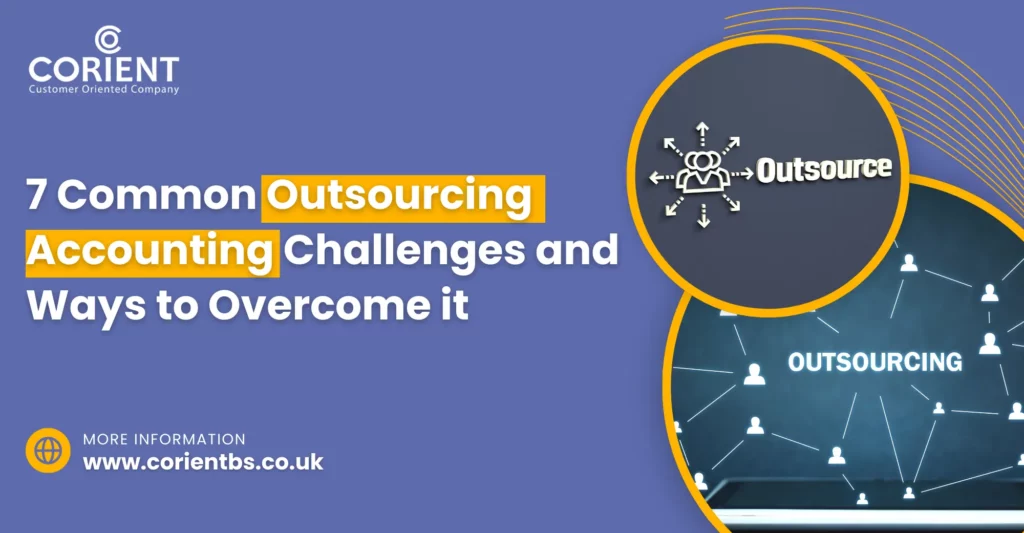
7 Common Outsourcing Accounting Challenges and Ways to Overcome it
Would it be correct to say that running an accounting practice in the UK has become increasingly challenging these days? The answer is yes, and you are not alone. The majority of accounting firms these days are finding it difficult to keep up with technology updates and regulatory changes. Negligence in adapting to new technological updates and regulatory changes will cause significant challenges to your accounting practice.
Some of these accounting issues are errors in financial statements, data security risks, and fraud. These errors have the potential to increase the chances of facing penalties from regulatory organisations. When you keep a tab on the latest updates and changes in technology and regulations that impact the accounting industry, you will easily overcome multiple accounting challenges by automating multiple tasks.
However, keeping tabs on updates and regulations and tackling multiple accounting challenges at the same time is a tough nut to crack. However, it can be tackled with the assistance of accounting outsourcing services offered by accounting service providers. But more on that latter, let’s first understand the accounting challenges faced by accounting practices in detail.
Accounting Outsourcing Challenges: A Double-Edged Sword
Facing accounting challenges while running your accounting practice is a day-to-day affair but can potentially hamper your operations and cause significant stress. Accounting challenges occur due to financial statement errors, undetected frauds due to lack of checks, non-compliance with regulations, and cyber security risks. These accounting challenges create problems for you and your clients by impacting their cash flow and increasing their risk of potential penalties for non-compliance. However, these accounting challenges can be tackled through accounting outsourcing but even this path is not free from challenges.
What Causes Accounting Problems for Accounting Practices? Key Factors to Consider

Various problems, including regulatory changes, technological disruptions, and internal inefficiencies, can disrupt the smooth functioning of your accounting practice and client services. Preventing these challenges is necessary to maintain client satisfaction, compliance, and operational optimisation.
Ever Changing Regulations
While running your accounting practice, you have noticed frequent updates in VAT rules and Make Tax Digital (MTD) regulations. Such frequent changes are challenging to keep a tab on, and missing out on them will have consequences for your clients. Also, changing regulations will increase your administrative burden due to reporting like P11D.
Lack of Resources
One of the pressing challenges facing accounting practices in the UK is the lack of skilled accountants who can perform specialised services like auditing. This shortage places an additional work burden on the existing staff, which increases stress and reduces productivity.
Procedural Inefficiency
Manual data entry is the source of many human errors, and some accounting practices still use this process. A lack of standardisation of workflows will cause delays and inconsistencies in output. Lack of integration with the accounting software and your client’s system will result in some nasty surprises.
Resistance Towards New Technology
Many accounting practices resist adopting new technologies like new software updates. The reason for this resistance is the expenses related to buying and training staff. The technology challenge can be tackled by opting for accounting outsourcing services. Outsourcing gives you access to new technology, and accountants trained on it at a fraction of the cost.
Client Management Issues
Multiple accounting practices face the common problem of maintaining effective communication with clients. Miscommunication, especially regarding submission dates of financial documents, leads to last-minute rushes. Also, a lack of clear communication with your clients leads to a lack of understanding of their requirements, leading to future problems.
How Do Accounting Practices Solve Accounting Problems Effectively?
Accounting practice is responsible for maintaining accuracy in the financial records and compliance with regulations, thus enabling your clients to make informed business decisions. However, this path is full of challenges and solving those challenges is important for smooth functioning. Here’s how you are going to solve this problem:
Getting in Experience and Expertise
Accounting practice must focus on hiring qualified accountants who specialise in UK tax laws, regulations, and compliance. Adequate attention must also be paid to regular training to adapt to regulatory changes and new technologies.
Adopting New Technologies
Always prefer to get into new technologies that will streamline your work efficiency. For example, accounting software like Xero will automate your accounting process and reduce human error. By adopting advanced data analytics, you will be in a position to patterns which will help you identify discrepancies. AI tools can take over repetitive tasks and improve accuracy, thus saving you time.
Standardisation of Accounting Processes
By implementing standardised procedures for bookkeeping, payroll, tax filing, and other tasks, you are promoting consistency. Also, a standard and easy-to-understand template for preparing various financial reports will save time and reduce errors.
Effective Communications
By regularly updating your clients about accounting tasks, you can avoid many misunderstandings and address issues. Tools such as dashboards can help promote effective collaboration and transparency between you and your clients.
Ensuring Complete Regulatory Compliance
Conduct audits at regular intervals to identify areas of non-compliance with regulations. You can ensure full compliance and avoid penalties on late tax filings by identifying non-compliant areas.
Offering Proactive Advice
It is your duty to advise your clients about their financial status proactively; this will help them devise plans for maintaining financial stability and liquidity.
7 Common Accounting Problems Faced by Accounting Practices and How Outsourcing Helps
UK accounting practices have to face countless accounting problems while offering their services. These problems arise due to changes in regulations, technological advancements, and client expectations. However, we have listed down 7 common accounting problems that occur regularly and how outsourcing can overcome them. These are as follows:
Staying Updated with Regulatory Changes
Frequent updates in tax laws, regulations, and accounting standards create problems, and non-compliance leading to penalties. Staying updated regularly and incorporating changes in your training will help you and your clients stay compliant. Outsourcing will give you access to an experienced team which will keep an eye on the regulatory changes and update you accordingly.
Managing Data Accuracy
Incorrect or incomplete data will hamper the timely preparation of financial reports. Any errors in data will lead to statement errors, submission delays, and additional scrutiny from regulators. However, proper data validation and informing your clients of accurate record-keeping can considerably reduce this challenge. You can take the help of accounting outsourcing service provider and automate the whole data process, thus eliminating the occurrence of human error.
Managing Technological Advancement

Adopting new technologies like AI, machine tools, and cloud accounting will be overwhelming but necessary to stay in the game. However, without adequate training on these technologies, your productivity will decline. That’s why selecting the right technologies for your practice is important, and then adequately training your accountants on them. You can also overcome your technical challenges by taking the valuable assistance from experienced outsourcing accounting service provider.
Tackling Cyber Threats
Thanks to the increased use of digital tools, cyber security has become a significant challenge in recent years. Any security breach can expose your client’s sensitive information to cybercriminals, leading to a reputation loss. Hence, it is essential to implement cyber-security measures and conduct regular audits. Outsourced accounting service providers have invested considerably on data encryption and other related data security measures making them capable for handle cyber threats and provide required assistance.
Retaining Skilled Talent
In the competitive UK accounting world, attracting and retaining accounting talent is a task in itself. A lack of skilled talent retention will lead to workflow disruptions and increased recruitment and training costs. However, you can increase your retention by offering benefits, clear career progression, and flexible work timings. If the issue still persist than you can avail accounting outsourcing services and address your talent shortage issue.
Increasing Client Expectations
Clients expect faster turnarounds in report generation, real-time updates, and financial advice. Meeting such high expectations can be challenging, as you must invest considerably in your human resources and technology. However, if you opt for accounting outsourcing, you will get the necessary backup to scale up your accounting services, thus meeting your client’s’ expectations without compromising on quality.
Managing Cash Flows
Accounting practices constantly face pressure to offer high-quality accounting services at reduced prices. If this pressure is not balanced properly, it can lead to reduced cash inflows, impacting investments in technology and talent. However, you can maintain a constant cash flow by streamlining your accounting processes, adding value to your services, and diversifying your offerings.
Conclusion
Challenges will always arise when offering accounting services to clients. Navigating and tackling those challenges is part and parcel of every accounting practice in the UK. We have made an earnest effort to identify those challenges, explain why they arise, and provide strategies for overcoming them. When you overcome those accounting problems, you make your practice strong, professional, and reliable to your clients.
In this journey to tackle these accounting problems, you can take the valuable assistance of accounting outsourcing service providers in the UK. While you will be spoilt for choices in the UK, Corient UK will be beneficial for you. Increasingly popular among accounting practices, Corient UK has been offering its accurate and tech-savvy accounting outsourcing services since 2011. We offer accounting services ranging from bookkeeping, payroll, year end to audit, management, VAT, and corporation tax services. Clear your doubts through our website contact form, and our executive will contact you.
We are hoping for a long-term and fruitful association.

